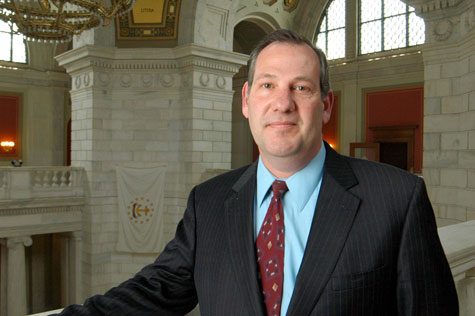
CONSERVATIVE VOICE "There has not been a true free-market voice in this state," says Felkner, the head of the
Ocean State Policy Research Institute.
Photo by Richard McCaffrey |
In a state known for its political obsessions, there is remarkably little in the way of rabid protest here.
So it was with some alarm that the denizens of Smith Hill watched a couple thousand partisans descend on the Capitol last month for a fervent tax-day rally against government spending.
There were bullhorns and American flags and all manner of signs railing against the General Assembly's thievery. It was, in short, the kind of thing a politician can't ignore.
But if the protest put a mild scare into Rhode Island's Democratic establishment, it provided a rare moment of exhilaration for the state's tiny Republican Party. "I don't think there have been that many people up in arms on the State House lawn since the Vietnam War," said Giovanni D. Cicione, chairman of the GOP, in a recent interview in his office.
Indeed, weeks later, Rhode Island conservatives are still buzzing about the "Tea Party" protest, part of a national day of right-wing remonstrations that lit up talk radio and the mainstream press.
After years of yawning budget deficits and stagnant economic growth in the Ocean State, here was the popular outrage the right has craved for so long. After years of one-party rule, here was the grassroots energy that could morph into real political power for the Republicans.
But for all the hope the event has engendered, there is also considerable doubt — even among the party faithful — that a damaged GOP can turn this moment to its advantage.
Once viewed as the good-government alternative to ethically challenged Democrats, the Republican Party lost some of its sheen when former Governor Edward D. DiPrete pled guilty to corruption charges in 1998.
The brand took another hit last year when former US Senator Lincoln Chafee, swept out of office in the Democratic catharsis of 2006, defected from the GOP — robbing the party of its moderate anchor.
In November, the already-bowed Republicans took a particularly savage beating at the polls — losing eight of their 18 seats in a 113-member General Assembly that is now the most Democratic state legislature in the country.
Six months later, the GOP's most prominent elected official, Governor Donald L. Carcieri, is mired in dismal approval ratings as his second and final term comes to a close. And the lone party man who has voiced interest in replacing him, State Rep. Joseph A. Trillo, is considered a long shot in a race starring — insult of insults — the all-but-official independent candidacy of a resurgent Chafee.
But the GOP, which last controlled the General Assembly in 1940, has not given up hope. Not yet, anyway.
There is a path, however narrow, to a conservative revival, officials say. And it looks something like this: The Rhode Island economy will continue to sputter and the bloated stimulus package will blow up on the Democrats.
The Republican National Committee's new chairman Michael Steele will pour millions into blue states in something akin to former Democratic National Committee Chairman Howard Dean's "50-state strategy," which sought to expand the political playing field.
And a new grassroots insurgency, which the public merely glimpsed with the Tea Party, will become a potent force for change.
Far-fetched? Perhaps. Intriguing? Certainly.
THE 'COUNTERBALANCING VOICE'
The Democrats' dominance of state politics is a creature of the liberal leanings of the Northeast, of ancient ethnic ties, of history and incumbency and fundraising prowess. But it also owes something to the small army of lobbyists and policy wonks and interest groups that have built up around Democratic politics.
There are the labor unions, of course. The environmental groups and anti-poverty advocates. Even the business community, a natural Republican constituency, has cleaved to the Democratic Party — a source of no small frustration for Cicione, the GOP party chair.
"They made a decision a long time ago that they were going to play ball with the Democratic leadership because they had the juice," he said.
But if the chamber of commerce is out of reach, for now, GOP officials can take solace in the quiet emergence of something new — a loose network of conservative advocacy groups and policy types and bloggers fired by the same frustrations that produced the Tea Party.
"You're beginning to see pieces of a counterbalancing voice," said Governor Carcieri, in an interview in his office this week.
The governor is behind one of the groups that has sprouted in recent years: Transform Rhode Island, which sponsors radio advertisements featuring Carcieri's pronouncements on taxes, welfare, and illegal immigration.
And there are other party-sponsored initiatives. On a recent Thursday night, about two dozen conservative souls gathered around fruit plates at a downtown restaurant for the launch of a most unlikely endeavor: the Rhode Island Republican Black Caucus.
"Our party's at a state right now," said caucus chairwoman Renay Omisore, "where we can only go up."